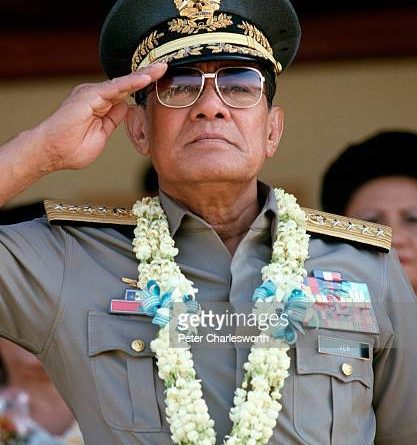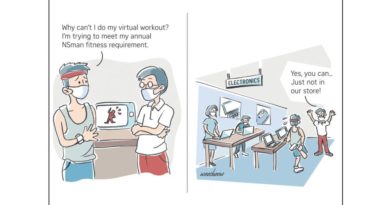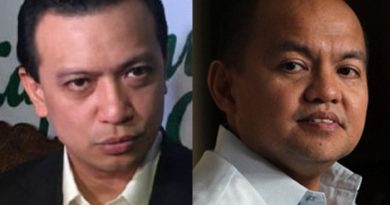2022 ELECTION | F.MARCOS TYRANNY | Sweden- General Ver’s daughter reckons with her father and the legacy of Martial Law
MANILA, PHILIPPINES – 1986/01/01: General Fabian Ver salutes at a military parade. He was one of Ferdinand Marcos’s right hand men and stayed loyal to the President throughout the ‘People’s Power’ revolution. Just a day before he was to flee the Philippines with the Marcos family, the General argued for permission to use heavy weapons against the rebels and presumably the ‘people’ – “We are ready to destroy them sir,” he told Marcos. The “People’s Power” revolution finally ousted the President of the Philippines. On February 25th 1986 Marcos and the First Lady, Imelda fled the country with their family and General Ver. Cory Aquino became the new President with Doy Laurel sworn in as her Vice President.. (Photo by Peter Charlesworth/LightRocket via Getty Images)
.
,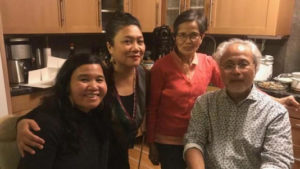
.
This project is the result of an investigation by a team of journalists at the University of Gothenburg, Sweden. Wanna Ver is part of this collaboration as both a source and co-author for this article.
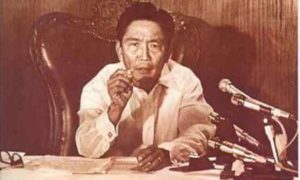
When Wanna was forbidden, for safety reasons, from joining her third-grade classmates at a movie theater to watch “Bambi,” General Ver’s soldiers fetched her a baby deer from Baguio. Wanna was not allowed to join a school camping trip either, so the school camped in her garden, in two army tents set up by soldiers.
Wanna’s father was Marcos’ armed forces chief of staff and head of the National Intelligence and Security Authority (NISA). Though suspected and later acquitted of the assassination of Senator Benigno “Ninoy” Aquino, Ver was in command of the armed forces during Martial Law, when the military was involved in multiple human rights abuses, including torture and forced disappearances.
General Ver, often tied up in the presidential palace, redeemed his absences with presents. Wanna loved Wonder Woman, so when Lynda Carter stopped in Manila, Wanna found herself in the star’s hotel room getting an autograph, arranged on her father’s orders.
Ads by:

Memento Maxima Digital Marketing
@[email protected]
SPACE RESERVE FOR ADVERTISEMENT
.
Yet it was not a completely happy life. Dressed in fancy clothes, Wanna was chauffeured daily in a stretch limo from the gate of North Forbes Park to her school in South Forbes. While she was stopped in traffic while crossing McKinley Road, children her age knocked on her windows, begging for a few centavos. “It was a lot of luxury and a lot of feeling guilty of how much I had and how little everyone else had,” Wanna said.
Her yaya (nanny) Tarcella Cerbules, or “Nanay,” as Wanna’s family called her, helped the young girl develop a sense of empathy. Nanay was the only staffer in Wanna’s home not from Ilocos Norte or Cagayan, the Marcoses’ base. “Nanay was from a poor province in Iloilo. She made me understand that many Filipinos didn’t have anything, and reminded me to not take my good fortune for granted,” Wanna said.
Ads by:

Memento Maxima Digital Marketing
@[email protected]
SPACE RESERVE FOR ADVERTISEMENT
.
Fleeing after the fall
Wanna’s mother, banker Edna Camcam, was General Ver’s long-time companion. After the 1986 People Power uprising overthrew the Marcoses, Ver and his first family fled with them to Hawaii. Edna, Wanna and her sister escaped to Hong Kong, where they were separated, searched and questioned—a traumatic event for the eight-year-old.
Once reunited with her father, Wanna asked him why her family kept moving from one country to another. “Better you don’t know,” General Ver replied. “The less you know, the safer you are.”
Ads by:

Memento Maxima Digital Marketing
@[email protected]
SPACE RESERVE FOR ADVERTISEMENT
.
Wanna, now 44, grew up in exile in the US and Europe. She was taught that the Philippines had needed heavy-handed martial rule to fight poverty and communism, and usher in a golden age. For a good part of her life, she believed that Marcos did many positive things for her country.
“People still say, my family included, that Marcos’ iron fist during batas militar saved us from communism. He built bridges, schools, our economy flourished, he put our country on the map,” she said. “After my father’s death, Mrs. Marcos told me that multiple PR firms were hired internationally to tarnish the Marcos name, so, when I saw anti-Marcos news, I wrote it off as foreign propaganda.”
.
Ads by:

Memento Maxima Digital Marketing
@[email protected]
SPACE RESERVE FOR ADVERTISEMENT
Ads by:

Memento Maxima Digital Marketing
@[email protected]
SPACE RESERVE FOR ADVERTISEMENT
.
Confronting the truth
In 1993, Wanna read “Waltzing with a Dictator,” a book on Marcos by the American investigative journalist Raymond Bonner. The book said that her mother was in fact her father’s mistress and she, an illegitimate child. Wanna, trained to be wary of such accounts and to view them as American propaganda, still wondered, “If my family did lie about that, what else might be lies?”
The questions remained in Wanna’s mind but she was not yet ready to confront them. Over the next two decades, while Wanna tried to separate herself from politics, friends encouraged her to write her memoir.
In 2019, Wanna was preparing for the birth of her first child, so she sought a doula to assist her delivery. She was assigned a Filipina, Michelle Söderman, an experienced doula from the Philippines who was newly licensed in Sweden. Wanna, her first client, was unaware Michelle was a “Martial Law baby.” “I know people who disappeared and never came back,” Michelle said.
As Wanna had grown accustomed to using her married name rather than her father’s, Michelle was unaware of her client’s family. But the day before Wanna’s due date, Michelle got an automated Facebook friend recommendation for a Wanna Ver. Michelle assumed Wanna was a distant relative of the Marcos general. What came to her mind, said Michelle, was “the image of Fabian Ver: the right hand of Satan or the devil, if not the devil himself.” She described feeling fear, anger and confusion. “If Wanna is connected to the devil, am I going to help her?”
Ads by:

Memento Maxima Digital Marketing
@[email protected]
SPACE RESERVE FOR ADVERTISEMENT
.
Michelle decided not to let Wanna in on her discovery. She did her job. When the child was born, Michelle realized: “How would you connect a beautiful child to the doing of an evil person?”
Nonetheless, Michelle refused to accept payment, worried that Wanna’s money was tainted and part of the funds stolen by the Marcoses from the Filipino people. She told Wanna she had resolved to ask her first client in Sweden to donate to a nonprofit she supported in the Philippines. The pandemic came, and they lost touch.
In 2020, Wanna began writing her memoir, in an effort to reconcile her conflicting understanding, and to work out how she would eventually tell her family’s story to her child. Her research revealed opposing Martial Law narratives, but it was viewing Lauren Greenfield’s documentary “The Kingmaker” that had the most impact.
“Before watching it, the data on human rights violations were names on a page, numbers on a graph,” Wanna explained. “After seeing the interviews of [human rights victims] Hilda Narciso, Etta Rosales and May Rodriguez, they turned into real people to me. They had been harmed and continue to suffer from the abuses of my father’s regime. It was the human rights survivors that made me finally realize that the Marcoses’ Golden Age history was a fabrication.”
Ads by:

Memento Maxima Digital Marketing
@[email protected]
SPACE RESERVE FOR ADVERTISEMENT
.
“The Kingmaker” also showed Ferdinand “Bongbong” Marcos Jr. being asked whether he should apologize for the abuses of his father’s regime. His response: “What am I to say sorry about?”
Wanna thinks differently: “I feel like a million sorrys is not enough,” she said. “I needed to learn the truth of what happened so I could tell a different story, to help those without a voice to tell their story… because of the role my father played in their suffering.”
Ads by:

Memento Maxima Digital Marketing
@[email protected]
SPACE RESERVE FOR ADVERTISEMENT
.
Recognizing the ‘Golden Age’ myth
A year after her child’s birth, Wanna reconnected with Michelle so she could come clean about her father. “Michelle almost fell over,” Wanna recalled. “She had to put her hands on the ground to hold herself up and she could barely breathe. She couldn’t believe it, she kept asking if I was the granddaughter, and I kept having to repeat: ‘I’m the daughter of General Ver.’”
Wanna asked to hear Michelle’s story and to be introduced to other survivors who might want to share their own stories. Michelle introduced Wanna to Nolasco “Noli” Buhay, who was wrongfully arrested, detained and tortured by the infamous 5th Philippine Constabulary Security Unit in 1973. “They tortured me a lot, undressed me, kicked me, hit me,” said Buhay. “I collapsed and could not feel anything after that. The second day was the same, and eventually I was bedridden.”
In 2011, thirty-eight years after his release, Buhay received a check for $1,000 as compensation from the government, a recognition of what had been done to him. This, he said, “gave me some relief that justice was being served.” To him it was “evidence of the Marcos family’s human rights violations and theft of the Filipino people’s resources.”
Ads by:

Memento Maxima Digital Marketing
@[email protected]
SPACE RESERVE FOR ADVERTISEMENT
.
Noli sought asylum in Sweden after his arrest and founded the Swedish-Filipino Association to support democracy in the Philippines. Buhay’s story, among others, helped Wanna recognize that the state, under Marcos and her father, had deliberately concealed the brutality of the Marcos regime from her and the Philippine public. She realized the Golden Age narrative had been propagated to obscure the documented facts and paved the way for the restoration of the Marcoses to power.
“We all noticed the cathartic nature of our meeting,” said Wanna. “I know I am not at fault for my father’s actions, but I believe listening to survivor accounts and offering an apology on his behalf requires relatively little effort on my part, and could potentially alleviate substantial suffering for them.”
This meeting and those that followed eventually resulted in the formation of Kapwa Pilipinas, an organization that promotes empathy and reconciliation for victims and perpetrators of human rights violations. Wanna, along with Michelle, Buhay, and his wife, were among the founders.
“It would be difficult for Marcos Jr. to revise history and dispute our past while a Ver is trying to record it,” said Buhay.
Ads by:

Memento Maxima Digital Marketing
@[email protected]
SPACE RESERVE FOR ADVERTISEMENT
.
Ads by:

Memento Maxima Digital Marketing
@[email protected]
SPACE RESERVE FOR ADVERTISEMENT
.
Seeking elusive justice
This article is the product of a collaboration between Wanna and her classmates at the University of Gothenburg in Sweden, who reviewed documents and data related to human rights abuses during the Marcos regime.
The team also interviewed abuse survivors, including writer Aida Fulleros Santos-Maranan, who was arrested in 1976. Maranan said she was physically abused, sexually molested, and psychologically tortured by being forced to play Russian roulette. Many arrests like hers were not recorded, she said, and although more than 11,000 Marcos victims had received compensation, many more were found ineligible. The government’s Human Rights Victims’ Claims Board was not given enough time and resources to conduct a thorough investigation, she said.
The trail of Martial Law abuses led to the United States and the cases of Silme Domingo and Gene Viernes, US-born Filipino labor union organizers and US citizens who were murdered in Seattle in 1981. Their deaths were part of a Philippine intelligence operation to suppress anti-Marcos dissidents abroad.
Ads by:

Memento Maxima Digital Marketing
@[email protected]
SPACE RESERVE FOR ADVERTISEMENT
.
In 1987, Seattle-based public interest lawyer Michael Withey, representing the Domingo and Viernes estates, deposed Ferdinand Marcos in Hawaii for four days. They won a US$15-million federal court jury verdict—the only case in history where a head of state of a foreign government has been convicted for murder in the US—and negotiated a$3-million settlement.
The team also reviewed the documents of Trajano vs. Marcos, a court case filed in Hawaii. Wanna saw her father’s name on one of the documents and again realized that, “It is not just a matter of claims or PR campaigns to tarnish the Marcos name. There is documentation, there were court cases, witnesses, a judge, a jury. They committed crimes against humanity. It may have been golden and shiny for us, but for them it was brutal, bloody and poverty-stricken.”
In 1995, US human rights litigator Robert Swift won in a Hawaii court the first worldwide human rights class action lawsuit, one filed against the Marcoses on behalf of 9,539 martial law survivors and their heirs. The case was settled for US$1.964 billion worth of US-based Marcos assets. In 2013, the Philippine government authorized the release of $245 million from the Marcos wealth as compensation for human rights victims.
Ads by:

Memento Maxima Digital Marketing
@[email protected]
SPACE RESERVE FOR ADVERTISEMENT
.
“I couldn’t understand how Marcos loyalists and Golden Age believers, myself included, could accept that no human rights atrocities occurred if thousands of people—enough to make a class action case—won in court and were financially compensated,” said Wanna. “To me this is crucial: it’s undeniable proof that this really happened.
“The majority of my family believes that people need to ‘forgive and bury the hatchet’ for the sake of our nation and the people. But I disagree. I feel this view implies that the Golden Age story and the Never Again story are somehow equal when they are not. Most of the people who suffered under Martial Law, who suffered systemic oppression at the hands of the Marcos regime, were student activists, farmers, informal settlers, the masa.”
Still Wanna confessed to being torn about her father, a man known colloquially as “Ver-dugo” at the height of Martial Law—wordplay formed by his surname with berdugo, meaning “executioner.”
Ads by:

Memento Maxima Digital Marketing
@[email protected]
SPACE RESERVE FOR ADVERTISEMENT
.
“This is a long learning process,” she said. “He’s still my dad, and somewhere deep down, I still hope I’ll find something that shows that there had been some kind of mistake, or that somehow his signing a paper is not as bad as him holding a gun to someone’s head, but I haven’t gotten there yet.”
For now, Wanna is offering one apology at a time for the crimes her father helped commit, and stands by the accounts of victims and survivors.
“In our culture we are taught to respect our elders, you know, utang na loob. We are indebted to them,” she said. “But I think it’s important to do our own research and to forge our own beliefs, look outside of what our family told us to believe. We need to listen to each other and acknowledge wrongs done before our country and people can heal and move forward. When my daughter grows up, I want her to be able to know her history and lineage without avoiding it, like I did. The shame I’ve carried for years can be debilitating. Still, I’ve learned that with work, it can also be transformed into healing.”
Ads by:

Memento Maxima Digital Marketing
@[email protected]
SPACE RESERVE FOR ADVERTISEMENT
.
— GMA News
This article General Ver’s daughter reckons with her father and the legacy of Martial Law was originally published in GMA News Online.
 Ads by: Memento Maxima Digital Marketing
Ads by: Memento Maxima Digital Marketing
@[email protected]
SPACE RESERVE FOR ADVERTISEMENT

